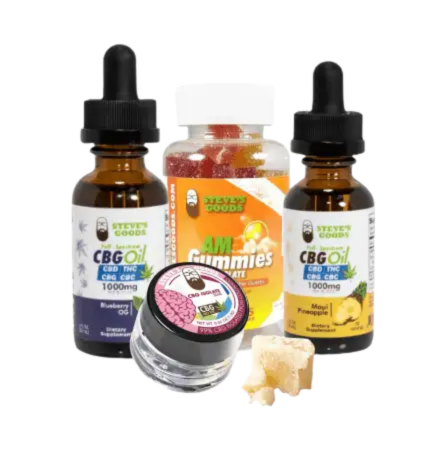What is CBG and what are its benefits?
+
Cannabigerol (CBG) is often called the "parent cannabinoid" as it's the precursor molecule that transforms into other cannabinoids like CBD and THC during plant growth. This makes CBG naturally scarce and more expensive to produce. Users typically report that CBG offers natural pain relief, reduced inflammation, and anti-nausea properties. Unlike THC, CBG is non-psychoactive, meaning it won't produce a "high" while delivering its beneficial effects.
What makes Steve's Goods CBG products different?
+
Since 2018, we've pioneered CBG product formulation in Colorado, developing expertise many competitors have followed. We control our entire quality process by growing our own hemp, ensuring superior products through every stage of production. This seed-to-shelf approach gives us precise control over cannabinoid ratios, extraction methods, and formulation, resulting in CBG products with unmatched quality and effectiveness.
What's the difference between Full Spectrum and Broad Spectrum CBG oil?
+
Our Full Spectrum CBG oil contains the natural profile of cannabinoids found in our hemp plants, including trace amounts of THC (under 0.3%), creating a complete entourage effect. We don't artificially boost CBG levels in these formulations because the natural balance is already optimal. Our Broad Spectrum CBG oil is THC-free with enhanced CBG content, ideal for those who want to avoid THC entirely while still experiencing comprehensive benefits similar to full spectrum effects without risking drug test complications.
What are CBG gummies and how do they work?
+
CBG gummies are edible products infused with precisely measured amounts of Cannabigerol, offering a convenient, tasty alternative to oils or concentrates. Our gummies provide consistent dosing in a familiar format, perfect for maintaining a daily CBG routine. They're absorbed through the digestive system, typically producing longer-lasting effects than other consumption methods. Because CBG is non-psychoactive, these gummies deliver benefits without altering your mental state, making them suitable for daytime use.
What are CBG slabs and isolate products?
+
CBG isolate powder and slab products are highly concentrated forms of Cannabigerol, typically containing 95%+ pure CBG. These CO2-extracted concentrates are ideal for users seeking undiluted CBG without additional compounds. While isolate powder can be added to foods or used in homemade formulations, CBG slabs are primarily used for dabbing or vaporization. These versatile products allow for precise dosing and can be incorporated into various consumption methods for experienced users who want to customize their CBG experience.
What ingredients are in your Broad Spectrum CBG oil?
+
Our Broad Spectrum CBG oil contains Colorado-grown hemp extract rich in CBG, complemented by minor cannabinoids, fruit and floral terpenes, and beneficial phytochemicals naturally present in the hemp plant. We deliberately include these nano and phytochemical components because they enhance the overall effectiveness through synergistic interactions. Unlike competitors who simply isolate CBG, our formulation preserves the plant's natural complexity while eliminating THC, resulting in a more complete and effective product.
Are there any risks associated with CBG products?
+
CBG is generally well-tolerated, but research is still developing compared to more studied cannabinoids like CBD. We recommend balanced use of CBG concentrates to avoid potential side effects from long-term overuse. CBG isolate and slab products work best as occasional supplements, food additives, or in combination with other cannabinoids rather than as daily high-dose concentrates. While CBG shows promising benefits, it shouldn't replace prescribed medications or treatments without consultation with healthcare providers.
When is the best time to use CBG products?
+
CBG is often described as a "daytime cannabinoid" due to its energizing and focusing properties, making it ideal for morning or afternoon use when mental clarity and productivity are desired. This contrasts with cannabinoids like CBN, which support relaxation and sleep. Many customers find optimal results by using CBG products during the day and switching to more relaxing cannabinoids like CBD or CBN in the evening, creating a balanced daily wellness routine that supports both productivity and rest.
Can I combine CBG with other cannabinoids?
+
Yes, CBG often works synergistically with other cannabinoids to create enhanced or targeted effects. Many users find that combining CBG with CBD provides balanced daytime relief, while our Day and Night Bundle pairs energizing CBG products for daytime use with relaxing CBN products for evening use. This complementary approach allows you to customize your cannabinoid experience throughout the day while potentially saving money compared to purchasing products separately.


